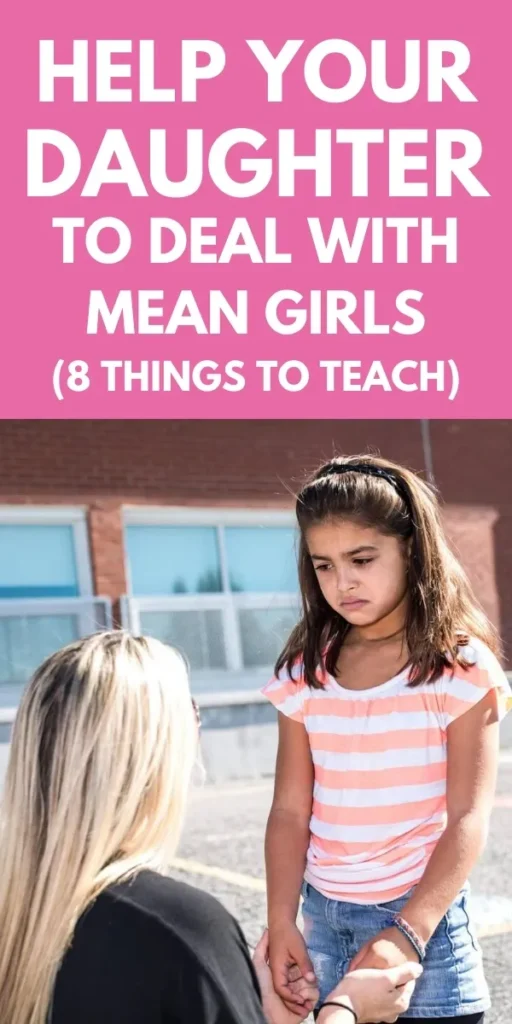Does it feel like someone stole your daughter’s sunshine?
Has the laughter faded from her eyes, replaced by a glint of hurt?
“Mean girls” can be a real confidence thief, leaving daughters feeling isolated and alone.
But you, mama bear, are here to fight back. With these tips, you’ll help your daughter reclaim her sparkle and sail through the social jungle with strength and grace.
Table of Contents
9 Signs Your Daughter Might Be Being Bullied

- Mood swings: Happy one minute, withdrawn the next? Pay attention to sudden changes in her usual demeanor.
- Loss of interest: Does she ditch activities she once loved? A drop in enthusiasm can be a red flag.
- Physical complaints: Headaches, stomachaches – sometimes stress manifests as physical symptoms.
- Damaged belongings: Ripped clothes, missing books – these could be signs of deliberate targeting.
- Changes in eating or sleeping: Trouble sleeping or a sudden drop in appetite can signal emotional distress.
- Social withdrawal: Is she avoiding certain people or places? A shift in her social circle might be worrying.
- Secrecy: Suddenly tight-lipped about school? She might be hesitant to open up about what’s happening.
- Unexplained injuries: Bruises or scratches? Get curious, but avoid accusatory questioning.
- Low self-esteem: Does she put herself down more often? A dip in confidence can be a result of bullying.
8 Tips to Help Your Daughter Deal with Mean Girls

Now that we’ve established the importance of listening and validating your daughter’s experience, let’s delve deeper into specific strategies that can empower her to navigate these social challenges.
1. Be Her Safe Space
Active Listening: When your daughter vents, put away distractions, make eye contact, and truly hear her. Phrases like “That sounds really tough” or “I’m so sorry you’re going through this” show empathy.
Avoid Judgment: Don’t jump to conclusions or blame her for the situation. Focus on understanding what happened and how she feels.
Open-Ended Questions: Encourage her to express herself. Ask “What can I do to help?” or “Can you tell me more about what happened?”
Example: Your daughter bursts in, upset about a comment a classmate made. Instead of saying “Ignore her, she’s just jealous,” try: “That sounds hurtful. Can you tell me what happened?” This opens the door for a conversation and shows you’re on her side.
2. Validate Her Feelings
Acknowledge Her Emotions: Let her know it’s okay to feel upset, angry, or hurt. Phrases like “It’s normal to feel this way” or “I would be upset too” validate her experience.
Avoid Comparisons: Don’t downplay her feelings with statements like “It’s not that big of a deal” or “Kids will be kids.” This can make her feel unheard.
Focus on Her: Listen to her specific concerns without bringing up past situations or other people’s experiences.
Example: Your daughter cries about a mean note left in her locker. Resist saying “Don’t worry, someone probably has a crush on you.” Instead, try: “That must be really hurtful. Can you tell me what the note said?”
3. Empower Her Voice

Practice Assertive Responses: Help her craft confident replies to put-downs or taunts. Role-play scenarios and encourage clear, direct statements like “I don’t appreciate that comment” or “Leave me alone.”
Focus on Body Language: Good posture, eye contact, and a firm voice project confidence. Practice these together in front of a mirror.
Humor Can Disarm: For less serious situations, suggest a witty comeback or a playful response to deflect negativity.
Example: Your daughter is worried about a girl who always makes fun of her clothes. Role-play a scenario where she can say something like “At least I wear clothes that make me feel good, unlike some people!” with a lighthearted smile.
4. The Power of “Walk Away”
Teach Her Boundaries: Help your daughter identify situations where it’s best to walk away. This doesn’t mean being cowardly – it shows strength and self-respect.
Practice “The Freeze”: Role-play a scenario where she maintains eye contact, doesn’t react, and calmly removes herself from the situation.
Avoid Giving Them a Reaction: Mean girls often thrive on drama. By walking away, she takes away their power.
Example: Your daughter mentions a group of girls whispering and giggling behind her back. Instead of suggesting she confronts them, discuss the power of ignoring them. Practice a confident walk away, head held high, and a focus on something else.
5. Help Her Find Her Tribe
Encourage Extracurricular Activities: Help her discover groups or clubs that align with her interests, fostering connections with like-minded peers.
Celebrate Differences: Emphasize that true friends appreciate her individuality and what makes her special.
Quality Over Quantity: A few close, supportive friends are far more valuable than a large group with hidden negativity.
Example: Does your daughter love art? Encourage her to join the art club. She’s more likely to find friends who share her passion and uplift her spirit.
6. Strength in Numbers: The Buddy System
Identify Potential Allies: Is there another girl being targeted, or someone who seems kind and inclusive? Suggest approaching them for friendship.
The Power of Two (or Three): Having a friend by her side provides emotional support and can deter bullies who rely on isolating their target.
Encourage Kindness and Empathy: Talk about the importance of standing up for others who might be facing similar situations.
Example: Your daughter mentions a shy girl who also gets excluded. Suggest inviting her to sit together at lunch or working on a school project together. Building a positive social circle can empower them both.
7. Adult Intervention (When Needed)

Open Communication: Schedule a meeting with your daughter’s teacher or counsellor to discuss the situation. Provide specific details and document any incidents.
School Resources: Many schools have programs or protocols to address bullying. Inquire about available support systems for your daughter and potential consequences for the bullies.
Teamwork Approach: Work collaboratively with the school. Maintain open communication, share updates, and advocate for your daughter’s safety and well-being.
Example: If the mean girls are relentless, it’s time to involve the school. Schedule a meeting and present the documented incidents. Work with the teacher or counsellor to develop a plan to address the situation.
8. Building Resilience
Focus on Inner Strength: Help your daughter develop a positive self-image. Encourage activities that build confidence and self-worth.
Developing Healthy Coping Mechanisms: Techniques like journaling, exercise, or relaxation exercises can help her manage stress and strong emotions.
Open Communication: Maintain open communication as she navigates these challenges. Let her know you’re always there to listen and support her.
Example: Talk to your daughter about the importance of inner strength. Encourage her to join a sports team or pursue a hobby she enjoys. Building confidence will make her less susceptible to negativity.
Also Read: Things a Mom Should Teach Her Daughter
Conclusion
Remember, you are your daughter’s biggest hero. When you foster open communication, equip her with coping skills, and work with the school, you can create an impenetrable fortress against negativity.
These “mean girls” might seem like they have the upper hand, but with your love and guidance, your daughter will learn to rise above the drama.
She’ll discover the power of her own voice, the strength of positive friendships, and the unwavering support you provide.
This journey may not be easy, but together, you’ll transform this experience into a chance for growth, resilience, and the unshakeable confidence to know her worth.

